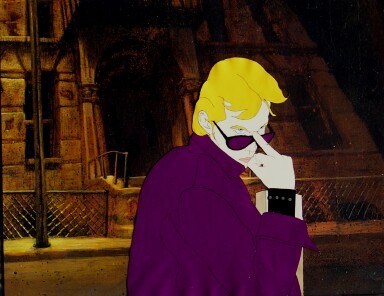I had heard of this film off and on for years, but never actually watched it until today. A friend of mine at work brought it in for me to watch, knowing about our little site – so I popped it in and was expecting to be mildly amused. Having experienced other Ralph Bakshi films in the past, I kinda knew what to expect, lots of expression and powerful focused animation with driven lines and brilliant use of perspective to show power and force, but I had no idea this film’s story would pull me in so much, much to the credit of writer Ronni Kern. The dark contrast using contemporary and classic artistic splash as the backdrop and the direct transformation of the characters by motion and music is wonderful to witness.
Normally I don’t give away spoilers in my review, but since this movie has been out since I was seven years old, I am making an exception. What made me roll off my couch and want to leap into the screen was the voyeuristic way we experience the character’s in American Pop. We travel with them from Mother Russia as they are forced out by the Cossacks as enemies of the Czar, while Zalmi hears his father murdered for praying the Torah. Says his father before his demise, I must not go, I must finish the prayer. Flash forward to punk era New York city, and the image above where Zalmi’s great-great-grandson, Lil Pete is cocking his glasses as he walks by, to look into a Jewish store where a Rabbi is reciting his prayers. Lil Pete just walks right by, with his little flip off nod, no doubt unaware of the path that led him there, while we, the audience are allowed to know how his family has transformed through lyric.
This film is very much like Forrest Gump and can easily be juxtaposed with the biggest exception being one man’s journey in Gump’s case to one family’s patriarchical voyage in American Pop. There is even a scene wherein Zalmi’s grandson, Tony (Lil Pete’s father – big time spoiler there) is just driving across the country in a stolen car, with dozens of people flocking to him, reminiscent of Forrest’s run across America. The story is fluid and the tempo changes along with the key throughout the film, but always in one steady measure, which I like in my sagas, makes it a lot easier to follow what is happening.
We see America transform in art and culture as the family advances. Key American events are the dotted quarter rests used to transition, from the Triangle Shirt factory fire, where we witness women leaping from a burning building, easily compared to our recent events. Watching the passing of the Volstead Act, World War I, World War II, Vietnam, and how each generation dealt with these defining events.
The acting was solid with no one I have ever heard of, browsing on imdb I was able to see Richard Moll (aka Nightcourt’s Bull Shannon) played the beatnik and character actor Vincent Schiavelli, best remembered as the subway spirit in Ghost has an easily identifiable voice – see if you can pick it out of this piece. But overall, I didn’t think of this film as a film, but more like some kind of dream, thinking of it like a film means I have to consider all the months of work, supporting cast-members, artists, sound guys, just everyone that goes into making a film, and thinking of Richard Moll in some recording studio just cheapens the experience of a dream. Think about if you could dissect your dreams – would they be as interesting if you knew how the master of dreams, whoever he or she may be, managed to present them to you? That is what you need to think of American Pop as, a dream that ‘ends’ in 1981, and that never ends in your heart as you strive to find your own beat and choose your own passion – that will lead your legacy as well.




